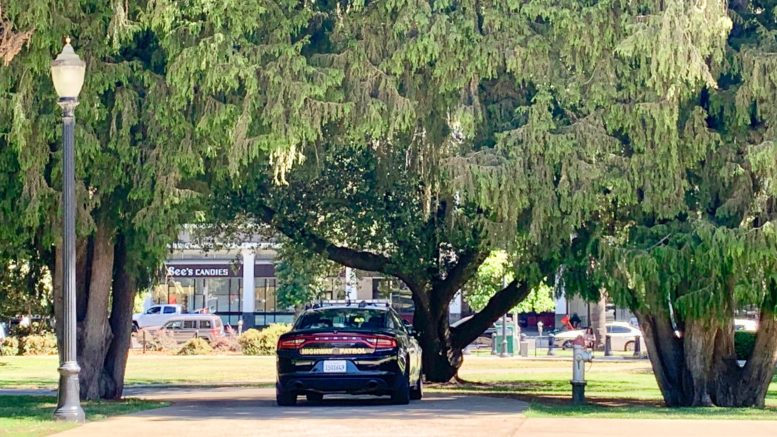No matter how many Americans have had their rights trampled through the forfeiture legal anomaly, Capital City leaders can’t get enough of the profits
Law enforcement agencies across the nation are still seizing and keeping peoples’ cash and property – in many cases, when a citizen hasn’t even been charged with a crime – and using the spoils of those raids to fund their special projects and out-of-reach wish lists.
Despite prominent liberal and libertarian groups agreeing that the practice is unconstitutional, Sacramento officials are once again eager to get their cut of the action.
At least one public agency in the region is making a different ethical call.
The law giveth, the law taketh away
In recent years, few legal issues have united progressives and conservatives more than opposition to civil asset forfeiture, which is the ability of local, state or federal law enforcement to permanently confiscate a citizen’s money and belongings over the claim that it’s somehow linked to crime.
Critics of asset forfeiture, including a number of veteran Sacramento attorneys, say that the burden of proof for police to engage in this conduct is incredibly low, while the hurtles and legal expenses for someone to get their property back is incredibly high.
Every year, the statewide and federal bounties from these seizures are liquidated and then channeled back to local governments through two different revenue-sharing programs. On June 8, the city of Sacramento’s Budget and Audit Committee began its annual plan for spending that incoming money. This year, it will be a total of $597,000.
Sacramento Police Chief Daniel Hahn began his presentation with a description of where these funds originated from.
“It’s the result of a court of law determining the assets seized during a criminal investigation are ill-gotten gains of illegal activity,” Hahn explained. “By a civil court order, the assets are then forfeited and then distributed among innocent property owners, crime victims, prosecutorial agencies and law enforcement agencies.”
While it’s true that, after a seizure, investigators have to petition a judge to keep their newly acquired treasures, Hahn’s description did not mention that this process merely involves articulating probable cause. It does not require a legal conviction to prove that anyone committed an actual crime. Moreover, in a good number of cases, it doesn’t even require the person be charged with a crime, let alone found guilty of one.
A recent investigation by reporters for Bay Area News Group determined that, between 2015 to 2018, Contra Costa County law enforcement netted $1.1 million by taking cash and property from individuals who were never formally arraigned on charges.
This element of asset forfeiture was not discussed at all by Sacramento’s police chief or councilmembers on June 8.
Then again, local chiefs and sheriffs have shown few reservations about their own officers engaging in asset forfeiture: According to data from the California Department of Justice, law enforcement agencies in Sacramento County led all other counties in the state in 2019 for employing the practice. In that year alone, they launched 666 asset forfeiture cases, and reaped roughly $7.1 million in real estate, property and cash.
On the national level, cases of officers abusing asset forfeiture to essentially rob innocent people while funding their own departments have been documented – repeatedly. California has had its own share of extremely questionable forfeiture stories in recent years.
Six months ago, after Contra Costa County’s stats came to light, the district attorney of that jurisdiction announced that she would no longer sign-off on asset forfeiture cases unless they involved someone directly being charged with a crime.
Gettin’ paid, gettin’ paid
Discussing their latest forfeiture loot, Sacramento officials were quick to stress that it was money being used for youth drug prevention and gang intervention programs. However, a closer look at the spending plan shows those are not its main priorities. Of the $597,000, some $200,000 is earmarked for the Sacramento Police Department’s straight operations and investigations. The next largest cut, $206,304, is being set aside for buying new police equipment. Additionally, $12,074 will be spent on police training, travel and per diem.
With the bulk of Sacramento’s funds already spoken for by some of very police commanders who engaged in the seizures that conjured the revenue in the first place, what remains will be allocated to a number of community-based organizations. Among the recipients are City of Refuge, the Neighborhood Wellness Foundation, the Brother to Brother program, Kops n Kids, and the Police Foundation cadet program and activities league.
Reviewing those nonprofits at the meeting, Mayor Darrell Steinberg expressed relief that they were getting more financial support than the City could otherwise offer on its own.
“You know, I look at all these great organizations and say, ‘There really isn’t a whole lot of money in the fund to fund as many of these programs as we want,’” the Mayor said. “This fund is important,” he added of the asset forfeiture program, “but more important is the general fund.”
Of all the councilmembers who spoke, only District 6 representative Eric Guerra mentioned that the City was wading into murky waters.
“I haven’t kept up on any recent studies, but I do recall in my previous work concerns about asset forfeiture,” Guerra acknowledged, “the collection of them, and the potential of these going to sustain long-term operations when this is revenue that’s one-time in nature – at least the hope is that it’s not going in nature.”
Guerra then elaborated that his own concern was Sacramento consistently using the forfeiture funds as a crutch to relieve pressure from basic general fund spending obligations. That, he insisted, needs to change.
“I’d like for us to start transitioning, with a shift in policy in the use of the asset forfeiture,” he noted, “for them to go less into long-term operations and more into capital, one-time expenses; and more [money] going into the drug and gang prevention programs.”




I cant believe this is constitutional. The big question should be how are they converting the assets stolen into cash. Do the police just pick a house or car and seize it and then sell it to each other? It seems corrupt and where is the oversight and accounting? Sad so sad……
the Supreme court ruled that civil forfeiture IS UNCONSTITUTIONAL well over a year ago,so why are these crooked police departments allowed to continue with this illegal practice.Could you find anything closer to COMMUNISM than the gov taking your property because they dont have to answer for their actions,this is what happens in the most corrupt countries in the world because the people have no voice,dont the pigs work for us the tax payer?Do they not have to follow a ruling from the SCOTUS?Are they not guilty of violating their oath to protect the constitution and the citizens of this country?then again criminals dont follow laws so it makes sense that these criminals dont give a dam about what the SCOTUS says ,who will stop them,wait until they start hauling people out of their homes and work place because they feel like making dome extra cash or their captain wants a super car from a suspected drug dealer even though that dealer actually does not sell drugs but cant defend himself against a mafia style gov law UPHOLDERS(calling themselves “law enforcement”is so wrong when their job is to UPHOLD THE LAW,its the courts that ENFORCE LAWS WITH CONVICtions and sentencing,there needs to be a federal task force that investigates,removes,arrests and sends to jail any of these pigs that violate taxpayers human rights and for people to see them all for what they are,a gang of murderers,rapists,racists,fascists and thieves and for joe public to stop supporting them as these pillars of morality and trustworth, to award them the right to kill whoever,wherever and however they feel like